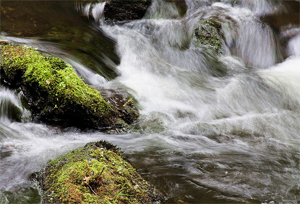
[This Tyee special series in co-operation with the Environmental Law Centre at the University of Victoria reveals what leading experts in environmental law say are needed improvements for protecting natural B.C. To read all their recommendations, download the free electronic publication "Maintaining Natural British Columbia for Our Children: Selected Law Reform Proposals." Today, we look at threats to British Columbia's water, and the way to protect it.]
Water is vitally important to the environment, the economy and the daily lives of British Columbians.
We need water for everything from taking a bath to watering the garden, from filling a reservoir to filling the toilet. And an adequate supply of clean drinking water is essential to our very lives and health.
Just as important, the blue and green veins running deeply through the province are the life-blood of nature. No plant or animal can survive without water. Biological communities are richest and most diverse along streams, wetlands and other water bodies.
At the same time, an adequate supply of water is necessary for a strong economy. Water is essential for fisheries and agriculture -- and for hydroelectric production, pulp mills, smelters, manufacturing and service industries. While healthy streams are obviously critical for tourism, adequate water supplies are also necessary for residential development. The preservation and wise use of the water resource is key to future prosperity in every community.
Unfortunately, Canada ranks as one of the most profligate users of water in the world, on average consuming two to four times more water per person than in Europe. Current water use in B.C. is increasing at a rate that exceeds population growth. Partly as a result, B.C. municipalities are reporting more water shortages. In 2003, severe droughts affected the Okanagan valley and Vancouver Island. In 2006, the "wet" area of Tofino ran out of water during the height of tourist season. The 2012 drought threatened water supplies -- as well as salmon runs and pulp mill jobs -- on Vancouver Island. Continued industrial, agricultural and urban growth will further increase pressure on already stressed water systems in different regions.
The B.C. Water Act is clearly not equipped to deal with emerging problems. The Act is one of the oldest laws in the province and was designed to promote industrial and agricultural growth when water was plentiful and human impact minimal. It focuses on allocating water for private uses (through licensing) and fails to mandate conservation, minimum flows for nature, and long term planning. It falls short on "adaptive management" provisions, which would allow flexible responses to changing environmental conditions and increasing demands on a finite water supply.
As the provincial government recognized in its Living Water Smart commitments, B.C. needs a comprehensive scheme that treats water first as the foundation of ecological, social and economic health—and not just as an entitlement held by licence. We need a scheme that treats water the way people perceive it: as a public resource that should be safeguarded for ecosystems first—and then made available through regional water planning for a variety of high efficiency uses.
The blueprint for reforming the Water Act has five elements:
1. Protect stream health and aquatic environments by establishing legally enforceable minimum environmental flows in each watershed system.
Low flows can threaten the water cycle in a region. They can lead to impacts on fish and wetland wildlife, pollution build-up, diminished recreational opportunities, and water bans for consumptive uses such as agriculture and lawn watering. Under current law, decision makers are not required to take specific ecosystem or water quality criteria into account when making water licensing decisions. Establishing and enforcing minimum flows will ensure that licensees are not taking too much water from any watershed -- and will make decision making about ecological health more transparent.
2. Improve water governance arrangements by creating regional Watershed Agencies that have a clear mandate, financial capacity and decision-making power.
Water governance in B.C. has developed in an ad hoc fashion, and there is now a wide range of local government and administrative bodies involved in water management. However, they are not operating under one land use and water management regime, even in the same watershed. The result is these bodies share a water supply, but fail to plan or operate together for sustainable water management. Given that all water systems (both surface and groundwater) are connected, it is essential that planning and management occur comprehensively across an entire watershed. Implementing watershed planning and management regionally allows the governance system to be more responsive to changing local conditions.
3. Improve the water allocation system.
The Water Act is based on the historical principle of "first in time, first in right" -- meaning that older licenses automatically take priority over newer licences. The purpose was to ensure certainty of water supply for licence holders as they developed their farms, industries, and mines. However, applying this priority doctrine today often makes no sense. Many streams are over-allocated, actual water use is not monitored, and the most senior license holder may not use the water for the highest and best use as determined by provincial and community priorities.
Water allocation must be based on maintaining minimum instream flows to ensure ecosystem function first. The regime for allocating water must also have some flexibility to respond to annual or seasonal environmental change. This requires monitoring, enforcement and drought planning. Review and amendment of existing licenses as part of regional water planning, as well as cost recovery from water use, are other key needs.
4. Regulate ground water use by requiring licensing in all areas of the province.
B.C. is one of the only jurisdictions in North America and one of the last in the world that does not regulate groundwater use. This ignores the basic functioning of the water cycle: ground water and surface water are one interconnected resource. To stop the practice of landowners drilling a well five metres away from a stream that is over-allocated, comprehensive groundwater licensing is imperative.
5. Enshrine the Public Trust Doctrine in the Water Act by acknowledging water as a public resource that the provincial government holds in trust for the public that must be preserved and maintained for future generations.
Water is widely viewed as a public resource. However, the Water Act's main focus is to allocate water to private users. Thus, there is no way to hold the provincial government accountable when water shortages affect ecosystems and the public interest. The solution is to make public use and conservation a priority and enable the public to legally enforce these goals.
The current Water Act is overdue for fundamental changes. It simply does not reflect ecosystem needs, modern values or socio-economic challenges. The BC government has already recognized the need for change and initiated the Water Act Modernization project. Now a new government will have the opportunity to create a modern water governance regime. Any new regime must ensure that environmental flows take priority through local water management. And it must ensure that water management supports ecosystems, the people that live in them and economic activities for generations to come.
For more information, see:
Oliver Brandes and Deborah Curran. Water Licences and Conservation: Future Directions for Land Trusts in British Columbia. The Land Trust Alliance of BC.
British Columbia's Water Act Discussion Paper. Ministry of Environment.
Statement of Expectations on Reform of the BC Water Act from BC Nongovernmental Organizations.
Oliver Brandes and Randy Christensen. The Public Trust and a Modern BC Water Act. POLIS Water Sustainability Project. ![]()
Read more: BC Politics, Environment
















Tyee Commenting Guidelines
Comments that violate guidelines risk being deleted, and violations may result in a temporary or permanent user ban. Maintain the spirit of good conversation to stay in the discussion.
*Please note The Tyee is not a forum for spreading misinformation about COVID-19, denying its existence or minimizing its risk to public health.
Do:
Do not: